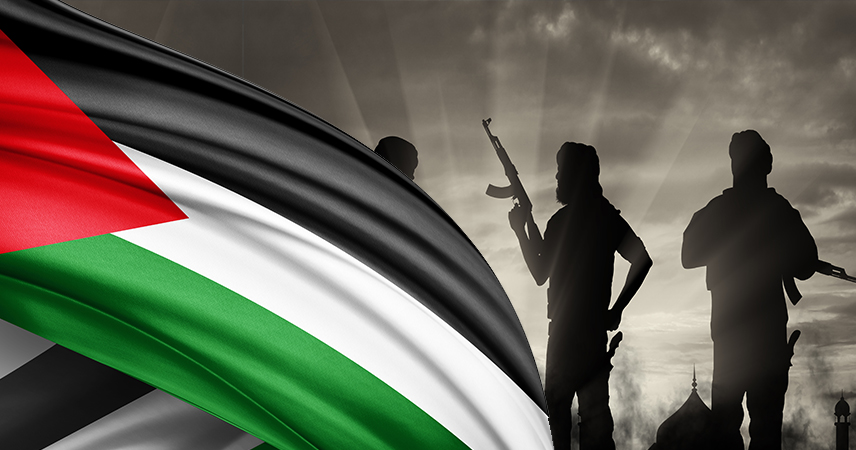Amid the ongoing war that Israel is waging on Gaza, observers have noted the unexpected absence of both "al-Qaeda" and "ISIS" from the conflict. The world is used to these groups being vocal about their interventions in major conflicts related to issues affecting some Islamic countries, including Afghanistan, Iraq, and Syria. Their current silence— both in terms of on-the-ground activities and media statements— has surprised many and raised key questions about their stance or strategy concerning the situation.
To understand this absence, we must consider the historical, ideological, and political factors shaping how these extremist organisations interact with local and regional conflicts.
The Palestinian cause has long been central to the rhetoric of Islamic groups of various orientations, considering it the foremost issue for Muslims against the Israeli occupation. Nevertheless, the engagement of organisations like al-Qaeda and ISIS with this cause has always been contingent on their shifting priorities.
Founded in the late 1980s, al-Qaeda has focused primarily on resisting the "far enemy," particularly the United States and the West in general, believing that liberating Palestine first requires the overthrow of Arab governments, which it perceives as having interests aligned with Israel and obstructing the liberation process. In practice, however, al-Qaeda's operations have had no real impact on the Palestinian front, and none of their attacks have ever been a response to an Israeli war on Palestinian territories. Al-Qaeda has neglected Palestine entirely, focusing instead on global operations.
ISIS, a splinter group from Al-Qaeda, concentrated more on establishing its so-called "caliphate" in areas of control in Iraq and Syria. It adopted a rigid stance, viewing Palestinian factions like Hamas as "Ikhwani" (Muslim Brotherhood) or "apostate" groups because they operate within national boundaries and engage in political and diplomatic activities. This extremist view led ISIS to ignore the Palestinian issue entirely and, at times, even attack resistance factions in Gaza.
A key reason for the absence of Al-Qaeda and ISIS from the recent Gaza war is their shifting priorities. For example, ISIS has been struggling with a significant collapse in its organisational structure since the fall of its so-called "caliphate" in Syria and Iraq and the disintegration of its main centres. Similarly, Al-Qaeda has faced repeated setbacks, including leadership losses and a weakened organizational structure. This has ultimately shifted its focus towards local conflicts in countries like Yemen, Afghanistan, and Mali. In this context, supporting or participating in a conflict like the Gaza war has become secondary to the immediate challenge of rebuilding their ranks and retaining operational capacity in their stronghold.
Their current strategy has shifted toward rebuilding their organisations and recruiting new fighters while maintaining a limited media presence aimed at a specific audience. Although the Palestinian cause may still resonate with some sympathizers, these groups prefer to prioritize local concerns over external conflicts that might strain their already limited resources.
Additionally, this absence can be seen as part of an avoidance strategy to preserve their remaining resources and capabilities amidst increasing international and regional pressure. Participating in a complex conflict like the Gaza war could expose them to further strikes, particularly given the heightened security measures in countries like Egypt, which has tightened its control over terrorist infiltration through Sinai. Moreover, international intelligence collaboration has made it difficult for these groups to operate in closely monitored regions such as Gaza.
Another key consideration is whether war against Israel is even a priority and a primary target for Al-Qaeda and ISIS. Their primary goal is fighting Arab governments, which raises many questions in this context. Despite Israel's continued control over Islamic holy sites, these groups have not targeted Israel with any significant internal attacks, nor have Israeli cities witnessed events akin to 9/11.
On October 7, ISIS welcomed the operation in Gaza, but when the war started, there was no intention from the group—whether its leadership or its militants—to join the war or even support Hamas in any form. Both ISIS and Al-Qaeda contented themselves with issuing a series of media statements expressing support for the Palestinian factions and opposing the displacement of Palestinians from their lands.
Several groups, including the General Command of al-Qaeda, al-Qaeda in the Arabian Peninsula, Al-Qaeda in the Islamic Maghreb, al-Shabaab in Somalia, and Jamaat Nusrat al-Islam wal-Muslimin, as well as some ISIS-aligned organisations, have released multiple statements since the events in Gaza began. These statements ranged from expressions of support and incitement to calls for expanding violence beyond Gaza, including targeting the West Bank, Israel, and Israeli interests abroad and urging "lone wolf" attacks against Israeli interests.
It seems that these extremist organisations are adhering to their previous stances regarding the Israeli-Palestinian conflict. This is partly due to the reality on the ground, as the Israeli siege and invasion of Gaza have created a strategic and military situation that is difficult to navigate. Meanwhile, these groups have continued their rhetorical support for the war despite the massive casualties among Palestinians.
In Israel, the government has also worked to prevent these terrorist organisations from engaging in the conflict. Israeli intelligence agencies, particularly the Shin Bet, have warned of the potential for extremist groups to operate inside the West Bank or Israel, with concerns about possible suicide bombings, vehicular attacks, or civilian targeting. However, such actions have not occurred, especially with Israel's heightened security along the West Bank and in high-risk areas.
Ultimately, the Gaza war is unlikely to alter the stance of al-Qaeda and ISIS. Both organisations have opted for grandiose media statements while avoiding direct involvement in the fighting, instead focusing on regrouping in their active areas. Some see this as a missed opportunity for them to return to the forefront of the scene.


